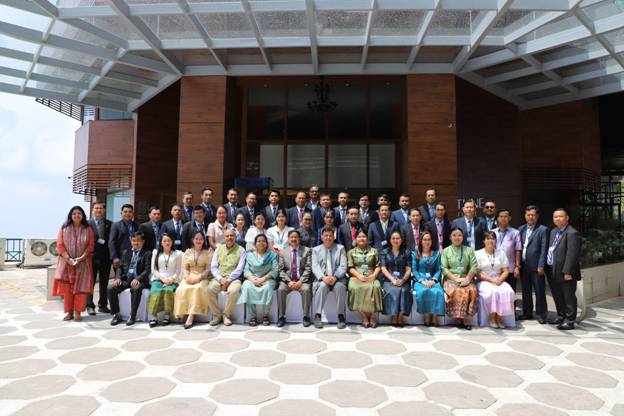The National Centre for Good Governance (NCGG) in Mussoorie commenced 5th Capacity Building Program on Public Policy and Governance for Cambodian Civil Servants today. The 2-week program is being organized from June 24 to July 5, 2024 in collaboration with the Ministry of External Affairs (MEA). The program is being attended by 40 civil servants from Kingdom of Cambodia, such as Joint Secretary, Director, Deputy Secretary and Under Secretary from the Ministry of Civil Services and Ministry of Senate. The program offers a platform for policy dialogue and sharing best practices, helping participants gain valuable insights into institutional transformation and citizen engagement.

The inaugural session was chaired by Shri V. Srinivas, Director General (DG) National Centre for Good Governance (NCGG) & Secretary Department of Administrative Reform and Public Grievances (DARPG), Government of India who highlighted the role of technology in bringing citizens closer to government, while optimizing transparency and accountability. India’s policy maxim of “Minimum Government and Maximum Governance” seeks to bring citizens and government closer using technology, and creating digitally empowered citizens and digitally transformed institutions. The example of CPGRAMS, the AI-driven public grievance redressal portal of India, was presented.
Mr. Mam Phoeuk, Deputy Director General, Ministry of Civil Services and head of delegation from Cambodia expressed gratitude to the Indian Government for this opportunity. He emphasized that the training programme would not only enhance capacity building but also foster bilateral dialogue and lead to strengthening of ties between India and Cambodia.
Dr. BS Bisht, Associate Professor, NCGG and Course Coordinator of the programme gave detailed information about National Centre for Good Governance and the milestones achieved by the NCGG over the years. In the elaborate presentation he discussed about objectives, activities, achievements, and future plans of NCGG and how it has evolved as a Centre for excellence. In the first week, the training will focus on a variety of topics, including Public Policy and Management, GeM: Bringing Transparency in Government Procurement, the Indian Constitutional Scheme, India-Cambodia Relations, Public-Private Partnerships in Infrastructure, Aadhaar as a Tool for Good Governance, Health Governance, the impact of Parliamentary Devices on governance, Best Practices from various development schemes, approaches to achieving SDG by 2023, Viksit Bharat: Policies and Developments in Industry and Infrastructure, Financial Inclusion, the Changing Paradigm of Governance, Leadership and Communication, Urban Governance and Sustainable Cities, Civil Services in India, Doorstep Delivery of Services, E-Governance and Digital Public Service Delivery, Gender Development, and Ethics in Administration, among others. The second phase of the program will include field visits to Smart City project and ITDA in Dehradun, District Administration in Gautam Buddha Nagar, Uttar Pradesh, the Union Public Service Commission and Indian Parliament. The programme also gives exposure to history and culture of the country during visits to the PM Sangrahalaya, Buddha Temple and the Taj Mahal.
It is noteworthy that NCGG has imparted training to civil servants of 17 countries viz. Bangladesh, Kenya, Tanzania, Tunisia, Seychelles, Gambia, Maldives, Sri Lanka, Afghanistan, Laos, Vietnam, Nepal, Bhutan, Myanmar, Ethiopia, Eretria and Cambodia.
Dr. Himanshi Rastogi, Associate Professor at NCGG, delivered the vote of thanks. The programme will be supervised and coordinated by Dr. B. S. Bisht, course coordinator, along with Dr. Sanjeev Sharma, co-course coordinator, Shri. Brijesh Bisht, Training Assistant, Ms. Monisha Bahuguna, Young Professional and the capacity building team of the NCGG.
****



0 Comments